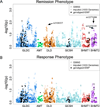Merging pharmacometabolomics with pharmacogenomics using '1000 Genomes' single-nucleotide polymorphism imputation: selective serotonin reuptake inhibitor response pharmacogenomics
- PMID: 22322242
- PMCID: PMC3303952
- DOI: 10.1097/FPC.0b013e32835001c9
Merging pharmacometabolomics with pharmacogenomics using '1000 Genomes' single-nucleotide polymorphism imputation: selective serotonin reuptake inhibitor response pharmacogenomics
Abstract
Objective: We set out to test the hypothesis that pharmacometabolomic data could be efficiently merged with pharmacogenomic data by single-nucleotide polymorphism (SNP) imputation of metabolomic-derived pathway data on a 'scaffolding' of genome-wide association (GWAS) SNP data to broaden and accelerate 'pharmacometabolomics-informed pharmacogenomic' studies by eliminating the need for initial genotyping and by making broader SNP association testing possible.
Methods: We previously genotyped 131 tag SNPs for six genes encoding enzymes in the glycine synthesis and degradation pathway using DNA from 529 depressed patients treated with citalopram/escitalopram to pursue a glycine metabolomics 'signal' associated with selective serotonine reuptake inhibitor response. We identified a significant SNP in the glycine dehydrogenase gene. Subsequently, GWAS SNP data were generated for the same patients. In this study, we compared SNP imputation within 200 kb of these same six genes with the results of the previous tag SNP strategy as a rapid strategy for merging pharmacometabolomic and pharmacogenomic data.
Results: Imputed genotype data provided greater coverage and higher resolution than did tag SNP genotyping, with a higher average genotype concordance between genotyped and imputed SNP data for '1000 Genomes' (96.4%) than HapMap 2 (93.2%) imputation. Many low P-value SNPs with novel locations within genes were observed for imputed compared with tag SNPs, thus altering the focus for subsequent functional genomic studies.
Conclusion: These results indicate that the use of GWAS data to impute SNPs for genes in pathways identified by other 'omics' approaches makes it possible to rapidly and cost efficiently identify SNP markers to 'broaden' and accelerate pharmacogenomic studies.
Figures


References
-
- Sorger PK, Allerheiligen SRB, Abernethy DR, Altman RB, Brouwer KLR, Califano A, et al. Quantitative and Systems Pharmacology in the Post-genomic Era: New Approaches to Discovering Drugs and Understanding Therapeutic Mechanisms. In: Ward R, editor. QSP Workshop Group. 2011. [ http://www.nigms.nih.gov/NR/rdonlyres/8ECB1F7C-BE3B-431F-89E6-A43411811A...].
-
- Kaddurah-Daouk R, Kristal BS, Weinshilboum RM. Metabolomics: a global biochemical approach to drug response and disease. Annu Rev Pharmacol Toxicol. 2008;48:653–683. - PubMed
-
- Rush AJ, Trivedi MH, Ibrahim HM, Carmody TJ, Arnow B, Klein DN, et al. The 16-Item Quick Inventory of Depressive Symptomatology (QIDS), clinician rating (QIDS-C), and self-report (QIDS-SR): a psychometric evaluation in patients with chronic major depression. Biological psychiatry. 2003;54:573–583. - PubMed
Publication types
MeSH terms
Substances
Grants and funding
LinkOut - more resources
Full Text Sources
Molecular Biology Databases

